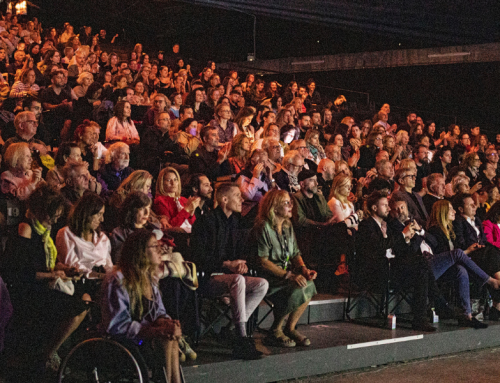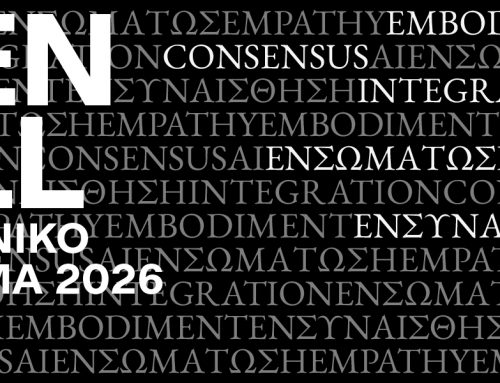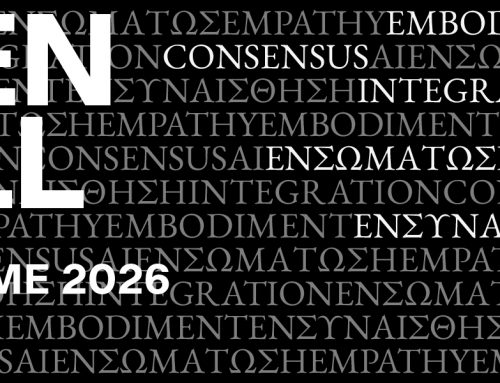March 29, 2021, 18.00 – 19.30: Andrey Smirnov
March 30, 2021, 18.00 – 19.30: Eleni Ikoniadou
March 31, 2021, 18.00 – 19.30: Wolfgang Ernst
Chronotopia is an international collaboration between Athens and Epidaurus Festival, Goethe-Institut Athen and Berlin’s CTM festival. Points of contact between past and current music, sound, and media practices are explored, for instance via re-articulations of pre-modern musical forms and practices, media-archeological research, or archives amongst others.
Last November and December the electronic music composition lab Αντηχήσεις / Echoes, was held online under the guidance of Greek sound artist and researcher Akis Sinos and German sound artist and researcher Anke Eckardt. The lab was aimed to professional composers and sound artists, and the six participants were chosen among dozens of submissions. Following research at the archive of the Contemporary Music Research Center (CMRC) in Athens, each participant created an original work of electronic music, drawing on material from past music. The six original sound works will be presented at Peiraios 260 as part of Athens Festival 2021.
Prior to the live presentations, audiences will have the opportunity to attend Chronotopia Echoes / Αντηχήσεις, watching a series of online lectures on 29, 30 and 31 March 2021, by Andrey Smirnov, Eleni Ikoniadou and Wolfgang Ernst respectively.
Lectures will be in English. No translation will be provided.
Lectures can be attended free of charge, on a first-come, first-served basis. Registration is mandatory (maximum number of participants: 25 persons).
*Registration closed for all lectures due to full capacity.
Chronotopia «Αντηχήσεις / Echoes» | The Reel
Lectures:
March 29th| 18:00-19:30: Andrey Smirnov
Title: RevArsAvr: Backwards to the Future
This lecture focuses on revolutionary Arseny Avraamov and his article ‘Upcoming Science of Music and the New Era in the History of Music’ (1916) as a manifesto and a major program for future creative research and developments in music and related sciences.
Russian composer, theorist and adventurer Arseny Avraamov was an early proponent of the mathematization of music and its’ restructuring according to principles derived from acoustical research. In 1916, one year before the Bolshevik coup, he published a manifesto-like article proposing the use of the language of mathematics to more easily and efficiently convey musical knowledge. Avraamov’s objective was to unite efforts of researchers and artists to produce a revolution in music theory and techniques based on the cross-connection of the arts and sciences. Among the subjects under consideration were the new approaches to musical theory, spectral-based musical composition, sound synthesis, polyrhythms and future enrichment of a rhythm by means of combination of the Ancient Greek and modern principles. While in Soviet times the name of Arseny Avraamov as well as his theoretical works were largely forgotten, in July 1940 one of the leading Russian composers Mikhail Gnesin asserted: ‘A. Avraamov should also be recognized as a founder of Soviet musical acoustics’. In turn most Russian inventions and developments (the Theremin, Graphical Sound, the Rhythmicon, ANS Synthesizer etc.) might be considered as direct or indirect consequences of Arseny Avraamov’s manifesto.
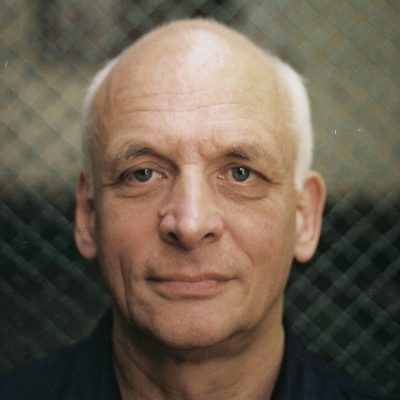
Andrey Smirnov is an interdisciplinary artist, independent curator, collector, writer. He is the founder of the Theremin Center, a research fellow at the Centre for Electroacoustic Music at Moscow State Conservatory, the head of the Rodchenko Sound Lab and a lecturer at the Rodchenko Art School in Moscow. He teaches History and the Aesthetics of electro-acoustic music, composition and the new musical interfaces. His main ongoing project is focused on restoring the censored history of artistically utopian early 20th century Russia. He is the author of the book Sound In Z: Experiments In Sound and Electronic Music in Early 20th Century Russia (Walther Koenig & Sound and Music, London, 2013).
March 30th | 18:00-19:30: Eleni Ikoniadou
Future Chorus
Imagine a chorus of voices—some human, some animal, some machine—arriving from an unknown space and time to perform a lament. Laments are extreme expressions of grief in the form of a song or poem. In ancient tragedy, a chorus typically (re)turns to the past to scan history for a precedent in search for meaning of the present. On this occasion, the chorus travels to the past not to learn from it but to rewrite it, from the perspective of those voices silenced by the archive.
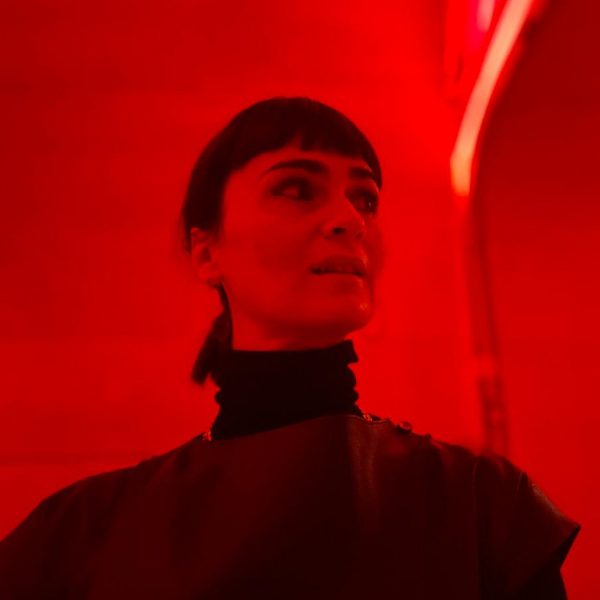
Dr Eleni Ikoniadou is Senior Tutor in Visual Communication and leader of the Experimental Communication pathway at London’s Royal College of Art. She curates and runs Fugitive Voices, a series of conversations with guest artists and theorists that seeks to locate practices and concepts that disrupt dominant narratives and official archives. As part of her art group AUDINT (audint.net), with Steve Goodman (kode9) and Toby Heys, she has co-edited the volume Unsound: Undead (Urbanomic, 2019) and produced a series of exhibitions, under the same title, funded by the Arts Council of England (2018-2020). She is founder and co-editor of the Media Philosophy Series (R&L) and author of the monograph The Rhythmic Event: Art, Media and the Sonic (The MIT Press, 2014).
March 31st | 18:00-19:30: Wolfgang Ernst
Where “time” takes “place”
Media-Archaeological Thoughts on the (Musical) Topologization of Chrónos in the Archive, and as (Sonic) Technológos
The Chronotopical Question
In a variation of Marcel Proust’s seminal novel title A la recherche du temps perdu, and in a word play with the term chronotopia itself, this lecture will be asking: Where does “time” take place at all? This talk will first discuss how our actual videoconferencing media determine our communicative co-presence, followed by a(re-) definition of the very term “chronotope“, with a reference to Michel Foucault’s seminal text “Of Other Spaces”. The musical “archive” will be contrasted with the sonic “recording”, with a focus on symbolic music vs. actual sound in the Athens KSYME institution and archive. The closer we focus on “time”, the more remote this parameter becomes, dissolving into a multitude of cultural techniques and technological operations. More radically “time”, as a reasonable and plausible parameter of analysis, itself gets lost in the present media condition.
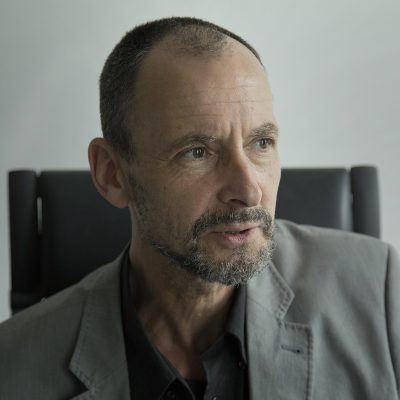
Having been academically trained as a historian (PhD) and classicist (Latin Philology and Classical Archaeology) with an ongoing interest in cultural temporalities, Wolfgang Ernst grew into the emergent technology-oriented “German school” of media science. His academic focus has been on archival theory and museology, before attending to media materialities. Since 2003, Ernst is Full Professor for Media Theories at the Institute for Musicology and Media Science at Humboldt University in Berlin. His current research covers “radical” media archaeology as method, the epistemology of technológos, the theory of technical storage, the technologies of cultural transmission, micro-temporal media aesthetics and their chronopoetic potentials, and sound analytics (“sonicity“) from a media-epistemological point of view.
Books in English:
-
Digital Memory and the Archive (2013)
-
Chronopoetics. The temporal being and operativity of technological media (2016)
-
Sonic Time Machines. Explicit Sound, Sirenic Voices and Implicit Sonicity in Terms of Media Knowledge (2016)
-
The Delayed Present. Media-induced interventions into contempor(e)alities (2017)
A collaboration of Goethe-Institut Athen with Athens & Epidaurus Festival, Berlin’s CTM and CMRC.


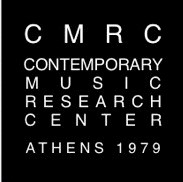
The Athens & Epidaurus Festival is funded by the Ministry of Culture & Sports








